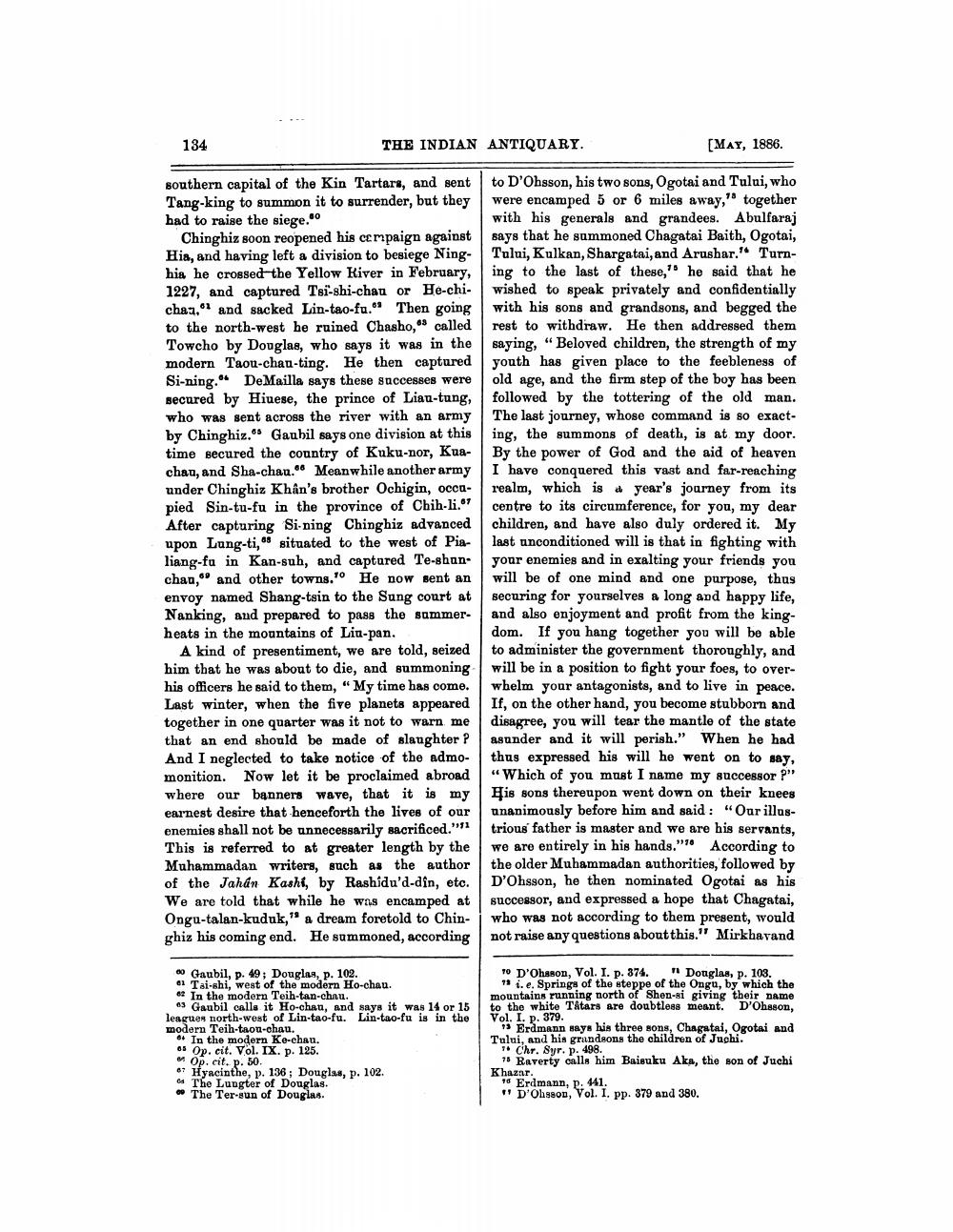________________
134
THE INDIAN ANTIQUARY.
[MAY, 1886.
southern capital of the Kin Tartars, and sent Tang-king to summon it to surrender, but they had to raise the siege."
Chinghiz soon reopened his campaign against Hia, and having left a division to besiege Ninghis he crossed the Yellow Kiver in February, 1227, and captured Tsi-shi-chan or He-chichan," and sacked Lin-tao-fu." Then going to the north-west he ruined Chasho, es called Towcho by Douglas, who says it was in the modern Taou-chan-ting. He then captured Si-ning. De Mailla says these successes were secured by Hiuese, the prince of Liau-tung, who was sent across the river with an army by Chinghiz. Gaubil says one division at this time secured the country of Kuku-nor, Kuachan, and Sha-chau." Meanwhile another army under Chinghiz Khân's brother Ochigin, occa- pied Sin-tu-fu in the province of Chih-li." After capturing Si-ning Chinghiz advanced upon Lung-ti," situated to the west of Pialiang-fa in Kan-suh, and captured Te-shunchau,'' and other towns." He now sent an envoy named Shang-tsin to the Sung court at Nanking, and prepared to pass the summerheats in the mountains of Liu-pan.
A kind of presentiment, we are told, seized him that he was about to die, and summoning his officers he said to them, "My time has come. Last winter, when the five planets appeared together in one quarter was it not to warn me that an end should be made of slaughter? And I neglected to take notice of the admomonition. Now let it be proclaimed abroad where our banners wave, that it is my earnest desire that henceforth the lives of our enemies shall not be unnecessarily sacrificed." This is referred to at greater length by the Muhammadan writers, such as the author of the Jahan Kashf, by Rashidu'd-din, etc. We are told that while he was encamped at Ongu-talan-kuduk," a dream foretold to Chinghiz his coming end. He summoned, according
to D'Ohsson, his two sons, Ogotai and Tului, who were encamped 5 or 6 miles away," together with his generals and grandees. Abulfaraj says that he summoned Chagatai Baith, Ogotai, Tului, Kulkan, Shargatai, and Arushar." Turning to the last of these," he said that he wished to speak privately and confidentially with his sons and grandsons, and begged the rest to withdraw. He then addressed them saying, "Beloved children, the strength of my youth has given place to the feebleness of old age, and the firm step of the boy has been followed by the tottering of the old man. The last journey, whose command is so exacting, the summons of death, is at my door. By the power of God and the aid of heaven I have conquered this vast and far-reaching realm, which is a year's journey from its centre to its circumference, for you, my dear children, and have also duly ordered it. My last unconditioned will is that in fighting with your enemies and in exalting your friends you will be of one mind and one purpose, thus securing for yourselves a long and happy life, and also enjoyment and profit from the kingdom. If you hang together you will be able to administer the government thoroughly, and will be in a position to fight your foes, to overwhelm your antagonists, and to live in peace. If, on the other hand, you become stubborn and disagree, you will tear the mantle of the state asunder and it will perish." When he had thus expressed his will he went on to say, “Which of you must I name my successor P" His sons thereupon went down on their knees unanimously before him and said: "Our illustrious father is master and we are his servants, we are entirely in his hands." According to the older Muhammadan authorities, followed by D'Ohsson, he then nominated Ogotai as his successor, and expressed a hope that Chagatai, who was not according to them present, would not raise any questions about this." Mirkhavand
60 Gaubil, p. 49; Douglas, p. 102. 01 Tai-shi, west of the modern Ho-chau. 12 In the modern Teih-tan-chnu.
03 Gaubil calls it Ho-chat, and says it was 14 or 15 leagues north-west of Lin-tao-fu. Lin-tao-fu is in the modern Teih-taon-chau.
** In the modern Ko-chan. • Op. cit. Vol. IX. p. 125.
Op. cit. p. 50. 67 Hyacinthe, p. 136 ; Douglas, p. 102. 6 The Lungter of Douglas.
The Ter-sun of Douglas.
TO D'Ohason, Vol. I. p. 374. Douglas, p. 103.
11 i. e. Springs of the steppe of the Ongu, by which the mountains running north of Shen-si giving their name to the white Tåtars are doubtless meant. D'Ohsson, Vol. I. p. 379.
13 Erdmann says his three sons, Chagatai, Ogotai and Tului, and his grandsons the children of Juchi.
" Chr. Syr. p. 498.
75 Raverty calls him Baibuku Aka, the son of Juchi Khazar.
16 Erdmann, p. 441. " D'Ohsson, Vol. I. pp. 379 and 380.




